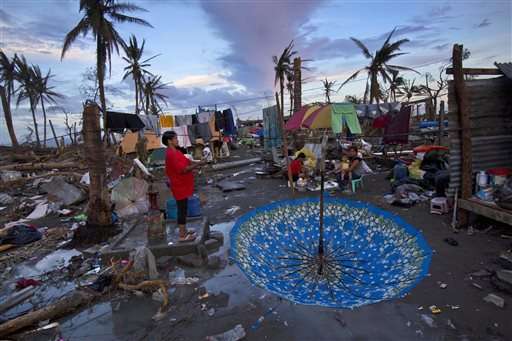ADB: Climate change makes poor poorer in Asia-Pacific

Climate change has been making the poor in the Asia-Pacific region even poorer and is also setting back efforts to haul them out of poverty, the Asian Development Bank said in a report Wednesday.
Combined with rising inequality, the two forces could make the more equal distribution of the fruits of economic growth a "distant goal" for the world's most populous region, where 700 million people—two thirds of the world's poor—still wallow in poverty.
"In one country after another, climate change frequently threatens to offset decades of gains in poverty reduction," the report said.
The report by the Manila-based lender says 1.5 million Filipinos have been pushed deeper into poverty and about 6 million lost their jobs in 2013, as a result of Typhoon Haiyan, one of the world's most powerful storms.
Rising inequality exacerbated by climate change risks from extreme weather also slowed poverty reduction efforts in Indonesia. If inequality and environmental factors had remained constant, the poverty rate would not have risen from 3.6 percent in 2010 to 11.3 percent in 2014, said ADB evaluation specialist Hyun Son.
"Environmental shocks push the poor into direr straits. Hence, responding to climate change helps to reduce inequality," said Vinod Thomas, head of the bank's Independent Evaluation Department, which published the report.
Haiyan, which devastated the central Philippines, drove more Filipinos into extreme hardship of living on less than $1.25 a day. Those who lost their jobs were mostly retailers, service crew, coconut farmers and fishermen. They now are even more exposed to greater hardships from another extreme weather event, the report said.
For a country like Indonesia, whose urban population is expected to rise to 65 percent of the entire nation by 2025 from 50 percent currently, there likely will be a rise in "urban deprivation" that will cause overcrowding and reduction in resources. This will strain public services, resulting in job and income losses as well as environmental shocks for the poor, the report said.
It said building "climate-resilient" infrastructure will help ensure that people, especially the poor, continue to have access to health facilities and market when disasters strike.
Such infrastructure is also crucial in other disaster-prone countries like Tajikistan in Central Asia, which is mostly mountainous, and Papua New Guinea, an island nation. However, climate change and its risks aren't viewed as an urgent development issue by their governments, the report said.
Social safety nets like cash transfers conditioned on improvements in health and education can also help mitigate the impact of climate change on the poor.
In Vietnam, the report said that such measures should be utilized for ethnic minorities who live in remote mountainous areas where people will be further cut off from basic services in case of a major calamity.
More information: www.adb.org/
© 2015 The Associated Press. All rights reserved.



















